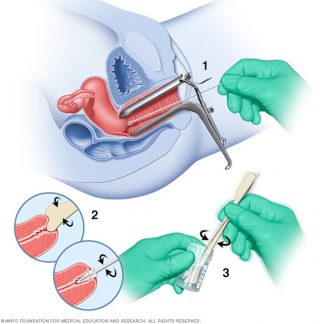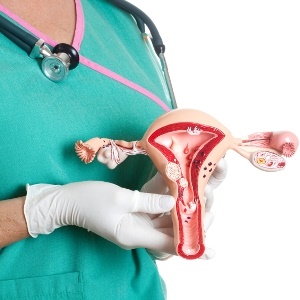 One afternoon, Mr. Njau, a middle aged typical African man, came to my clinic for his annual medical checkup. He was accompanied by his dear wife and they both looked distraught. Continue reading I KNOW AM RISKING MY LIFE
One afternoon, Mr. Njau, a middle aged typical African man, came to my clinic for his annual medical checkup. He was accompanied by his dear wife and they both looked distraught. Continue reading I KNOW AM RISKING MY LIFE
Blog
6 THINGS YOU NEED TO KNOW ABOUT CERVICAL CANCER TESTING?

- WHAT IS PAP SMEAR?
It is a procedure to test for cervical cancer in women that involves collecting cells from the cervix, the lower, narrow end of the uterus.
- WHY IS IT IMPORTANT?
It helps in early detection of cervical cancer, hence improving chances of cure.
A Pap smear also detects changes in the cervical cells that suggest cancer may develop in the future. Detecting these abnormal cells early with a Pap smear is the first step in halting the possible development of cervical cancer.
- WHY IS IT DONE?
To screen for cervical cancer.
The test is usually done in conjunction with a pelvic exam. In women older than age 30, the Pap test may be combined with a test for human papillomavirus (HPV) — a common sexually transmitted infection that can cause cervical cancer. In some cases, the HPV test may be done instead of a Pap smear.

- WHO SHOULD DO A PAP SMEAR?
Any female above 21 years.
- HOW OFTEN SHOULD IT BE REPEATED?
Once every year. If combined with HPV test, the repeat can take even 5 years. However, depending on certain conditions, it can be repeated severally, of course with the doctor’s advice. These conditions include;
1.A diagnosis of cervical cancer or a Pap smear that showed precancerous cells
2.Exposure to some hormones eg. diethylstilbestrol (DES) before birth
3.HIV infection
4.Weakened immune system due to organ transplant, chemotherapy or chronic corticosteroid use
5.A history of smoking
6. WHEN SHOULD YOU STOP DOING THE TEST?
- After an hysterectomy (complete removal of the uterus and cervix)
- Old age i.e. 65 years and above.
AUTHOR:
Sally Gakii, Lab Superintendent, Imara Mediplus Hospital
Date posted: 6/10/18
REFERENCES:
- Smith RA, et al. Cancer screening in the United States, 2017: A review of current American Cancer Society guidelines and current issues in cancer screening. CA: A Cancer Journal for Clinicians. 2017;67:100.
- Curry SJ, et al. Screening for cervical cancer: US Preventive Services Task Force recommendation statement. Journal of the American Medical Association. 2018;320:674.
ARE YOU EATING UNHEALTHY? TIPS ON WHAT TO AVOID
There are only 2 types of foods you should never eat: one that’s rotten or one that’s stolen. With the growing body of knowledge supporting the connection between diet and overall health, many consumers are taking personal health and nutrition decisions into their own hands. Every week you can find promotions on a new diet for radical weight loss or a social media food scare about particular foods being dangerous. However, the bulk of our information is supplied from unverified sources such as blogs, office chats, and even friends and family. This has created opportunities for misinformation and “health fraud”. If you are caught in a whirlwind of mixed nutritional messages, you are not alone. Unfortunately, sensational headlines increase the nutrition hype surrounding wacky food trends and create food confusion. We have an endless list of such trends; Today’s celebrity culture continues to promote myths such as, “sugar causes diabetes;” or “wheat is bad for your health”.
Fad diets are unusual, and often unsustainable. They promote eating patterns with short-term benefits, but may have serious long-term effects on one’s overall health. These diets are often trendy and may be popular for short periods of time. Fad diets have no scientific basis, and promote ideas that consuming (or not consuming) certain food items, vitamin and mineral supplements, and combinations of certain foods, will help one lose weight or prevent /cure a disease. Examples include the “detox diets”.
/cure a disease. Examples include the “detox diets”.
Each person has a unique relationship between food and their body type. Science tells us that obesity is a complex condition influenced by genetics, food choices, portion sizes, personality traits, physical activity and sometimes a disease process or other physical ailment. Yet there are those eager to simplify this complex condition and blame a particular food as the sole cause. A visit to a qualified clinical nutritionist/dietician will unearth All the fads and myths. They will educate you on strategies that empower true, long-term behavioral changes and encourage you to make your own nutrition decisions based on your body type and scientific fact.
To help guide your daily food choices & lead a healthier life it is imperative for one to have a meal plan. A meal plan should take care of both your calorie needs as well as nutritional requirements. It’s the easiest & healthiest way to know what to eat, when to eat it and even occasionally when to eat those “unhealthy” foods such as bacon, juicy burgers or even chips. An experienced nutritionist will compose an individualized meal plan for you.
 At Imara our team provides this service. Contact us on 0722353250 to set up an appointment with our nutritionist. You will not only get a meal plan, but also receive a lifestyle transformation coaching experience that may change your view on health and lifestyle.
At Imara our team provides this service. Contact us on 0722353250 to set up an appointment with our nutritionist. You will not only get a meal plan, but also receive a lifestyle transformation coaching experience that may change your view on health and lifestyle.
Tips on Preventing Malnutrition In Children
 Malnutrition in children is one of the challenges facing Kenyan families. Malnutrition means “poor nutrition” and can refer to:
Malnutrition in children is one of the challenges facing Kenyan families. Malnutrition means “poor nutrition” and can refer to:
- Under-nutrition – when your body doesn’t get enough nutrients
- Over-nutrition – when your body receives more nutrients than needed
Malnutrition originates not just from a lack of or excessive food, but from several interrelated processes. These processes include general health, food preparation, sanitation and hygiene, food storage amongst others. We shall focus on under-nutrition.
Under-nutrition is caused by a lack of nutrients in your diet, either due to a poor diet or problems absorbing nutrients from food.
Symptoms of malnutrition in a child can include:
- The child not growing at the expected rate or not putting on weight as would normally be expected (faltering growth)
- Getting ill often or taking a long time to recover from sickness
- Wasted muscles with flabby thighs
- Developmental delay
- Mental retardation
- Poor teeth growth
- Lack of natural hair shine i.e. dull and dry, thin and sparse, silky hair that easily falls
- Low reduced appetite and lack of interest in food and drinks
- Nails can be spoon-shaped and very brittle
- Low Energy levels and tiring more easily than other children
Under-nutrition in children is commonly caused by:
- poor dietary intake of foods
- lack of appetite
- disrupted digestion and food absorption due to illness
- increased demand for energy for bodily processes like growth and development
- Long-term health conditions e.g. Diabetes, heart disease, allergic diseases, cerebral palsy
Diagnosis
Several factors are taken into account to check whether a child is malnourished or at a high risk of malnutrition.
Diagnosing malnutrition in children involves taking a measurement of their weight and height and comparing it against the expected average height and weight for a child of that age. Some children will be below average because they’re naturally smaller, but a significant drop below the expected level could indicate a risk of malnutrition.
A child may be considered at a high risk of malnutrition if:
- they have an illness which may reduce their appetite and thus they are likely to eat nothing for the next five days
- they don’t absorb nutrients from food well – for example, you having a condition, such irritable bowel or allergic to some food components that cause the digestive system to become inflamed
- they have disease condition such as cancer, HIV, and others which force the body to use up nutrients at a higher rate or have an increased need for nutrients
- they have difficulty eating and drinking
Blood tests may be used to measure: vitamin, mineral or protein deficiency.
Management
The treatment of malnutrition depends on the underlying cause and how severe your child is malnourished. This may be treated at home as an outpatient or in very severe cases, may require admission into Hospital.
At home treatment will usually include, a nutritionist appointment to discuss and plan with you changes you should make to your child’s diet. Severely malnourished children need to be fed and rehydrated with great care. You cannot afford to give them a regular diet. Once their condition stabilises they can gradually be introduced to a normal diet
Your dietary plans will depend on your individual circumstances, but in most causes you’ll be advised to gradually increase your child’s intake of energy, protein, carbohydrates, fluids, and vitamin and minerals. The aim is to reduce your child’s risk of developing complications, such as infections, and to avoid hospital admission.
You may also be advised to take special nutritional supplements which can increase your child’s energy and protein intake. You’ll be helped to set targets and your progress will be regularly monitored by a nutritionist.
If your child can’t feed orally they may need an artificial method of feeding such as a feeding tube. These are fitted in hospital but can at times also be used at home
Prevention
The prevention of malnutrition in children starts with an emphasis on prenatal nutrition and good prenatal care. Appropriate breastfeeding practices, timely vaccination and immunization and appropriate introduction of nutritious complimentary foods at 6 months.
The best way to ensure you get the correct amount of nutrients is to eat a healthy diet.
A healthy diet contains foods from all the major food groups in the appropriate portions according to age and nutritional status.
The four main food groups are:
- fruit and vegetables – at least 5 portions a day
- Carbohydrates – bread, rice, potatoes, pasta, cereals and other starchy foods
- Milk and dairy foods – such as cheese and yoghurt
- Meat, fish, eggs, beans, nuts, and other non-dairy sources of protein
Foods and drinks high in fat or sugar aren’t essential for children and should only be consumed in small amounts.
At Imara mediplus hospital we have an experienced nutrition team that can help you prevent, identify and manage malnutrition. Personalized nutrition counselling by our team will build a foundation for your child’s health and wellness that will last for a lifetime. Call us on 0722353250 for more information or to book an appointment.
IMARA STAFF GO TO PRISON

Kenyan prisons are one of the scariest places someone would like to end up. For our National Police and Prison warders, this is their daily environment. However, for the prisoners living in this places the reality is even worse. Few Kenyans have dared to visit this prisons, but we as Imara Mediplus decided to take our services to the people we felt needed it the most.
On the 22nd & 23rd of November 2017, Imara Staff facilitated a medical camp at the Embu Prison. We provided free doctor’s consultation, dental check-up and lab tests such as:
- Full hemogram- to check a persons blood level(Hemoglobin) and white blood cell count(indicates infection)
- Calcium levels
- Blood Sugar- to screen for diabetes
- Blood grouping
We attended to more than 70 people during the 2 day event. Although, we were not allowed to take any photos, the experience will forever remain in our staffs minds and hearts. We hope to do a similar event in 3 months. You can contact us if you would like to participate as a volunteer- 0722353250.


WHAT IS DIABETES
Diabetes is a disease that causes uncontrolled high blood sugar. Food such as rice, ugali and bread are naturally broken down by the body to form blood glucose aka blood sugar. Blood sugar is used to provide your body with strength and energy. The levels of this blood sugar are normalized by a hormone called insulin, which is produced by the pancreas. However, in diabetes, the pancreas doesn’t produce adequate amounts of insulin or in certain cases, it doesn’t respond to the insulin it produces.
There are 2 main types of diabetes:
- Diabetes type 1- This is where the body does not produce adequate amounts of insulin. It is usually caused by an autoimmune response against the pancreas i.e. the body produces antibodies against its own pancreas. Ultimately, the pancreas is destroyed and thus cannot produce adequate insulin to support control of blood sugar. This type commonly occurs in childhood.
- Diabetes type 2- This is where the body does not respond properly to the insulin it produces. It most commonly occurs in adulthood. It is also frequently associated with obesity and a family history of diabetes.
HOW TO DETECT:
Diabetes is detected by having a random blood sugar test. This test is available at Imara Mediplus Hospital and other Hospitals. The test measures the level of blood sugar, levels above normal may be a sign of diabetes and the doctor may request for other tests to confirm the diagnosis.
WHO SHOULD GET TESTED?
The following people are more likely to develop diabetes:
- Pregnant women
- Obese
- Family history of diabetes
- High blood pressure
14th November is world diabetes day. The mission is to promote knowledge on diabetes, promote care, prevention and cure of diabetes in the world.
HOW TO KEEP YOUR CHILD SAFE FROM PNEUMONIA

Pneumonia is one of the leading causes of morbidity and mortality in Kenya in children Under Five years. It’s important for Mothers, Guardians, and caregivers to understand:
- What pneumonia means
- What are the most common symptoms
- What are the danger signs and
- most importantly when to seek medical attention and ways of prevention
By definition, Pneumonia is an infection of the lungs, which could either be Bacterial and Viral predominantly. However, it may be caused by other organisms e.g. fungus.
Main symptoms include Cough, Fever, Vomiting, Signs to suggest Difficulty in breathing will include Inward retraction of the rib cage (lower Chest wall Indrawing) and Fast breathing which is relative to age

Danger signs will include bluish discoloration (Cyanosis) of mucus membranes, best demonstrated below the tongue, palms and soles of feet, Inability to feed and reduced levels of consciousness
Its recommended for mothers/guardians to seek medical attention any time they suspect their children to have developed pneumonia. It is important to remember that Nonsevere Pneumonia can be managed as an outpatient/ at home. However, as a mother/ or caregiver, you must be warned and aware of all the Danger signs. Severe Pneumonia with Danger signs present usually requires inpatient care for the administration of intravenous antibiotics and other supportive care including oxygen.
Prevention of pneumonia includes vaccination against Pneumonia and Influenza which are major causes BUT mothers should also remember that Exclusive Breast-Feeding for 6 months plays a key role in boosting your child’s immunity.
Please contact us at Imara Mediplus 0722353250 for more information. We provide the following services 24hrs a day with regards to pneumonia treatment and prevention:
- Vaccination
- Doctor’s consultation
- Pediatrician Clinics
- Lab & Pharmacy
“TRICKS” to finding breast cancer early.
Being Cancer month we have taken it upon ourselves at Imara Mediplus to give at least 15 free health talks to groups and organizations in Embu town. So far, we have given over 10 talks in the month of October.
Our talks revolve around easy tips & tricks you can use to help discover cancer early. Here are some of the tips and tricks you can use to detect early warning signs of breast cancer:
1. Feel for breast lumps. This may be the earliest sign. Do a breast exam both lying down and standing.
2. Check for any nipple discharge. Any breast discharge other than milk in a breast feeding mother is not normal.
3. Breast pain. Breasts should not be painful.
4. Skin changes. This include: color change, hardening of the skin, wounds on the skin etc.
If you discover any of the above. Please seek medical advice as soon as possible. It could just save your life.

Our team over at Imara Mediplus explained these tricks and tips to early detection of Breast Cancer during one of our open sessions at SMEP EMBU earlier this week. During the session, the team led by Dr. Mureithi also covered tips to early detection of other types of cancer. Please contact our marketing manager( Mr. Maina-0708 347 062) if you would like us, Imara Mediplus, to give your organization or group a free health talk.
Highlights from the forum:








